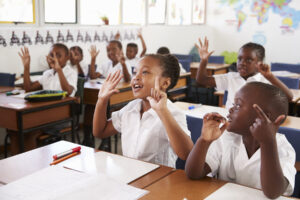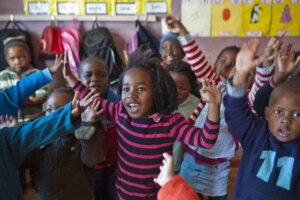Before you relocate, and during your first week in South Africa, you need to decide where to live, find a house, set up banking, and register with a doctor and dentist. You would also need to become familiar with driving in the country.
When your family moves with children, you must understand the education system to find the best primary and secondary schools. Choosing the right secondary education system in South Africa is crucial as it can affect their further study and career choices.
To help you, this article explores the following topics:
The secondary education system in South Africa
The Department of Basic Education (DBE) oversees primary and secondary education in South Africa. It usually spans six years and divides into two phases or bands.
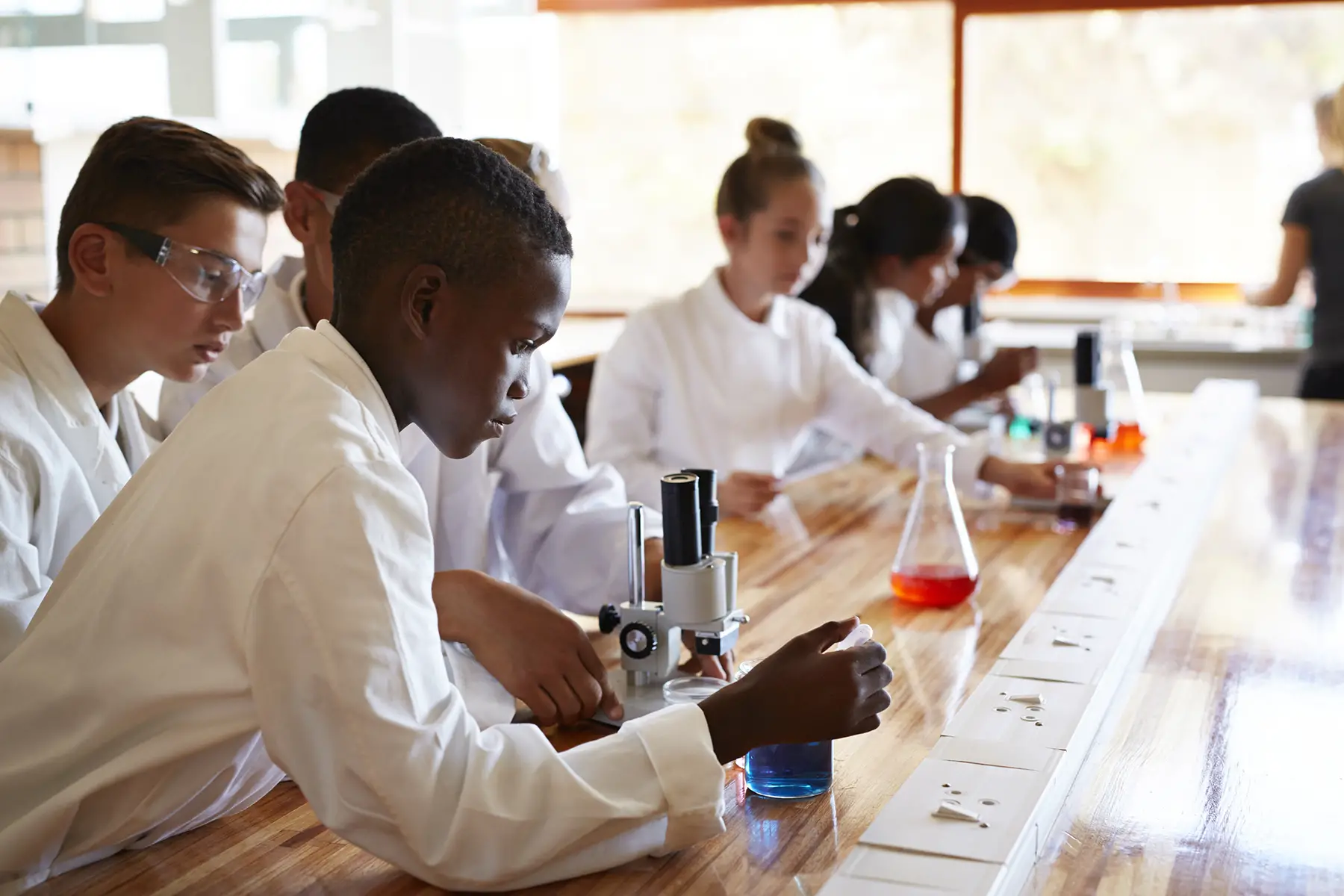
The General Education and Training (GET) Band covers the Lower Secondary or Senior Phase (Grade 7 to 9). Students are typically aged between 12–15.
The Upper Secondary Phase or Further Education and Training (FET) Band includes the last three years of secondary school, Grades 10 to 12 (16–18). Students can choose to complete this phase at an academic or technical/vocational school. However, to access the Upper Secondary Phase, students must officially pass the ninth grade.
At the end of the 12th grade, students must sit for the National Senior Certificate (NSC) to graduate high school. Colloquially referred to as Matric, students have to pass this qualification to enter university. Notably, Grade 12 students also write so-called record exams around May or June. Universities often use these results to grant learners preliminary acceptance, as they must apply before their final exams.
Children living in South Africa can access public or private high schools. International schools fall into the independent category. However, these institutions charge much higher fees and often have more stringent admissions processes and longer waiting lists.
Independent schools often follow a different syllabus than the National Curriculum Statements (NCS) and offer other qualifications, such as the International Baccalaureate (IB) Diploma, British A-Levels, or the French baccalauréat.
State/public secondary schools in South Africa
Most of the country’s secondary students (95.2%) attended state high schools in 2018. In 2021, just under 4.7 million students out of almost 5 million were enrolled in public secondary education in South Africa.
State schools are not free, apart from a few no-fee schools in the country’s poorest areas. Instead, schools are divided into five quintiles. Quintile 1 (Q1) schools receive the most state funding. They also charge the lowest school fees as they are considered in the lowest-income communities. In contrast, Quintile 5 (Q5) schools receive the lowest government subsidies as most parents can generally afford higher school fees.
Parents can expect to pay between R30,000–60,000 per year for public schools, depending on the child’s grade. However, parents who do not meet the income threshold can apply for full or partial fee exemptions. Parents must also consider the extra costs of buying school uniforms and stationery and providing a packed lunch. Typically, schools will supply textbooks. There may be a small tuck shop to buy snacks, called a snoepie, but often no cafeteria or provided lunches.
There are no state-controlled private schools, but they can apply for state subsidies.
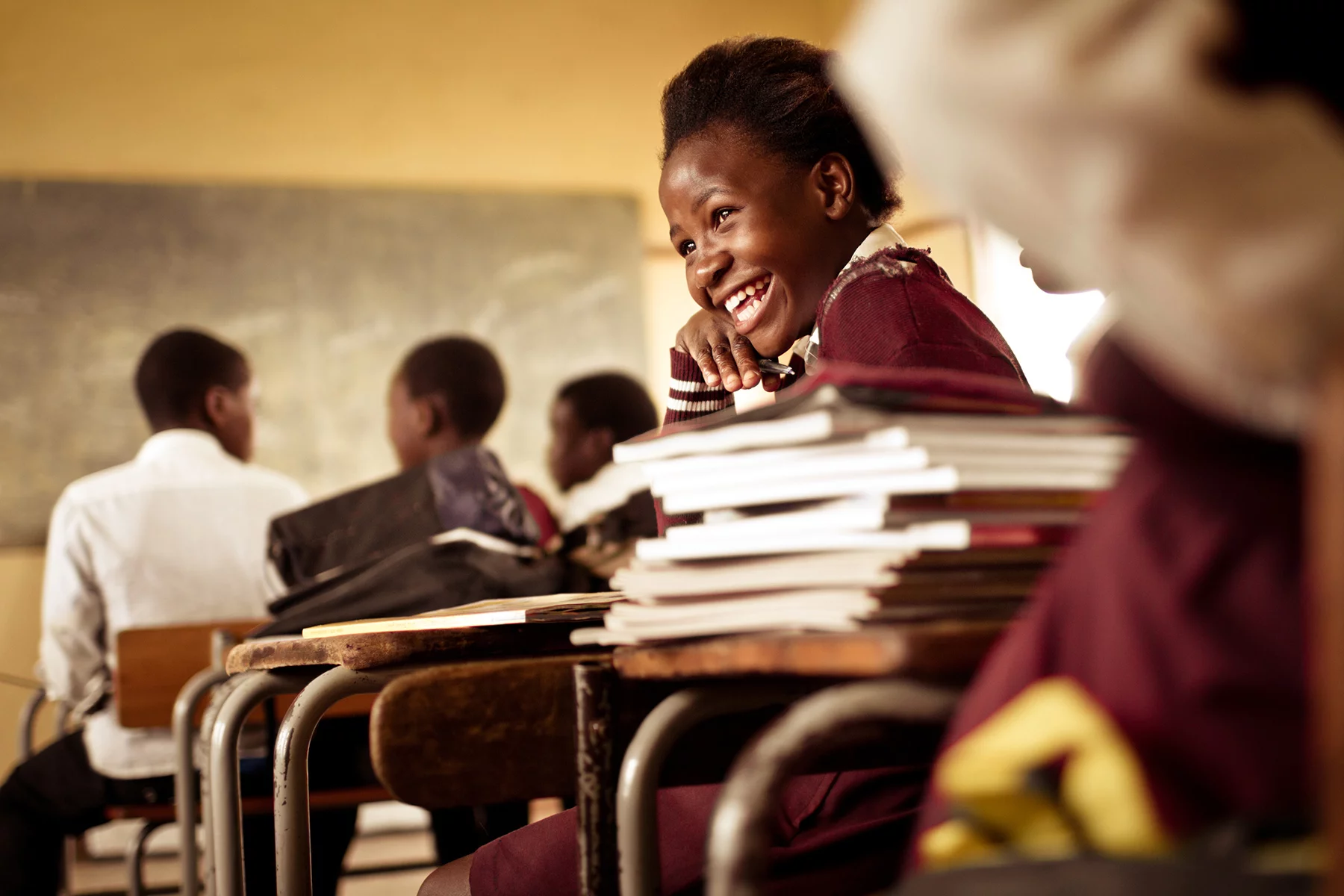
Unfortunately, the standard of education between public schools differs, often perpetuating the social inequality existing in other sectors of society. For instance, some evidence suggests that schools with higher fees and less state funding (e.g., Quintile 5 versus Quintile 1) often perform better academically in some learning areas.
The curriculum in state secondary schools in South Africa
The school year at public schools runs from January through December across four terms. Students get two weeks off around Easter, three weeks in June/July, a week in September/October, and a five-week summer holiday in December/January.
During the Senior Phase, students attend 27.5 hours of class each week and study the following subjects:
- Languages (two to three of the 11 official languages)
- Mathematics
- Science
- Technology
- Economics
- Arts and Culture
In the Upper Secondary Phase or FET Band, students also attend 27.5 hours of class per week, but the subjects vary. At the beginning of Grade 10, students can choose to follow an academic or technical stream. Those who choose the former attend ordinary academic schools, while those on the latter track attend Vocational and Technical Education Training (VTEC) colleges. In total, students take seven subjects.
Mandatory subjects include:
- Mathematics
- Two official languages
- Life Orientation (LO)
The remaining three can be specific to their interests or career goals, including subjects in:
- Arts
- Science
- Technology
- Life sciences
- Business
- Agriculture
- Vocational/career orientated
Most public secondary schools also offer extracurricular activities and sports, depending on their resources and facilities. Typically, these can include:
- Rugby
- Football
- Athletics
- Tennis
- Field hockey
- Netball
- Swimming
- Chess
- Debate
- Music/Drama/Theatre
- Art
- IT
Parents would need to buy any relevant sports clothing and equipment. For other activities, you would need to look for an independent club.
The pros and cons of state schools in South Africa
Usually, one of the biggest advantages of state schools is that they are free. However, parents still have to pay relatively high costs for secondary education in South Africa. Of course, these are still more affordable than private schools.
In addition, students will integrate better into the South African culture by making local friends and learning at least some of the official languages.
However, you would also need to do your research, as you cannot be guaranteed high-quality education at your local school. As such, some state schools may have large class sizes and limited resources, which could affect their standard of tuition and facilities.
Applying to secondary state schools in South Africa
Students planning to attend a state high school submit their application in their final primary year (Grade 7). Parents are generally advised to apply to at least three state high schools. The application deadlines vary by province, and each school has its own enrollment procedure.
There are no catchment areas or geographical restrictions. Still, priority may be given to children living close to the school or if they have siblings who already attend.
To apply, a student must complete the school’s application form and present the following documents:
- Birth certificate
- Latest school reports
- Immunization records
International children will also have to show their study visas and residency permits.
Private secondary schools in South Africa
In 2021, out of 24,900 schools, 2,154 were independent. These include primary and secondary education. Data also shows that only 4.7% of all secondary students attended independent schools.
Typically, private schools in South Africa combine primary and secondary education on the same site, which allows for a smooth transition from primary to high school.
Due to these schools’ high tuition fees, most South Africans cannot afford private education for their children. As such, fees can range between R100,000–200,000 per year. However, there is a drive to make private education accessible by establishing more affordable schools. This new brand of inclusive private institutions includes school groups, such as:
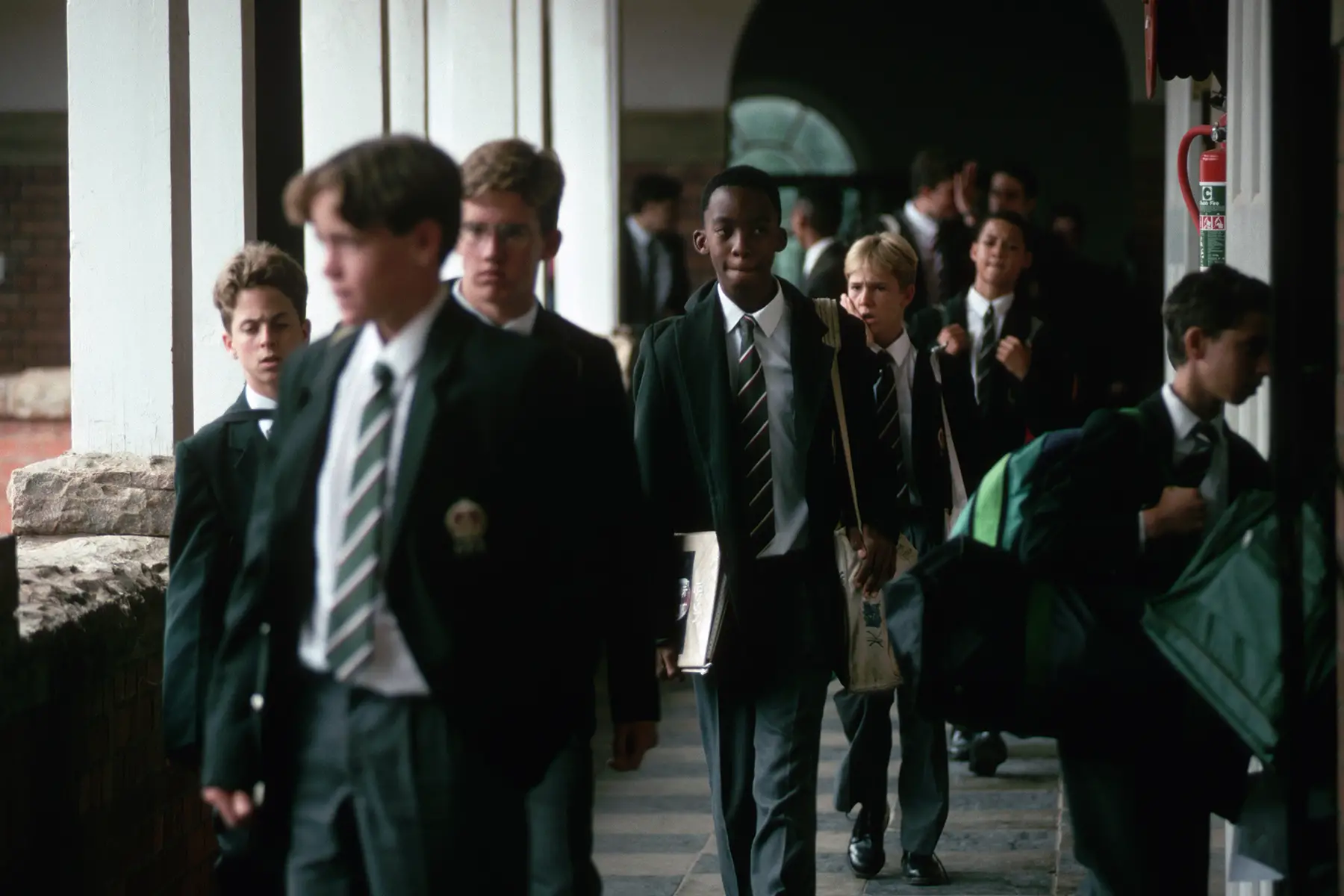
Many independent schools pride themselves on offering high-quality education, superior amenities, and small class sizes. Most are single-gendered, but a few can also be co-ed. Many enroll as day students, but some schools also have boarding facilities. Some of the most well-known ones in the country include:
There are several types of private secondary schools in the country, including the ones outlined below.
Religious schools
These schools focus on a spiritual — or religious — education while teaching an academic syllabus. For example, students will receive pastoral care from a Christian, Jewish, or Islam faith perspective alongside traditional subjects like maths and science.
Although there are not too many religious secondary schools in South Africa, some of the more popular ones include the King David Schools (Jewish), Sacred Heart College (Catholic), and Johannesburg Muslim School (Islam). One of the most internationally well-known Christian schools in South Africa is the musical Drakensberg Boys Choir School.
Montessori schools
Although Montessori schools are popular for primary education, only some South African schools, including the Village Montessori School, offer secondary education. During high school, these institutions focus on analytical thinking and independence and encourage students to take an interest in current affairs and their community. Students tend to work at their own pace and shape their subject choices around their interests and abilities.
Steiner-Waldorf schools
Another popular education approach includes Steiner-Waldorf schools. This holistic teaching method follows the child’s unique developmental stages and nurtures critical thinking, independent working, creativity, and lifelong curiosity. Five schools in South Africa offer secondary education, including:
- Constantia Waldorf School (Constantia, Cape Town)
- Roseway Waldorf School (Durban)
- Michael Mount Waldorf School (Bryanston, Johannesburg)
- Michael Oak Waldorf School (Kenilworth, Cape Town)
- Stellenbosch Waldorf School (Stellenbosch, Cape Town)
International schools in South Africa
There are 53 international schools in South Africa, which are popular among the immigrant community. They offer a high standard of education, a multicultural environment, and a strong extracurricular program. Still, this comes at a price. For example, the American International School of Cape Town (AISCT) charges R206,032 per year for secondary education.
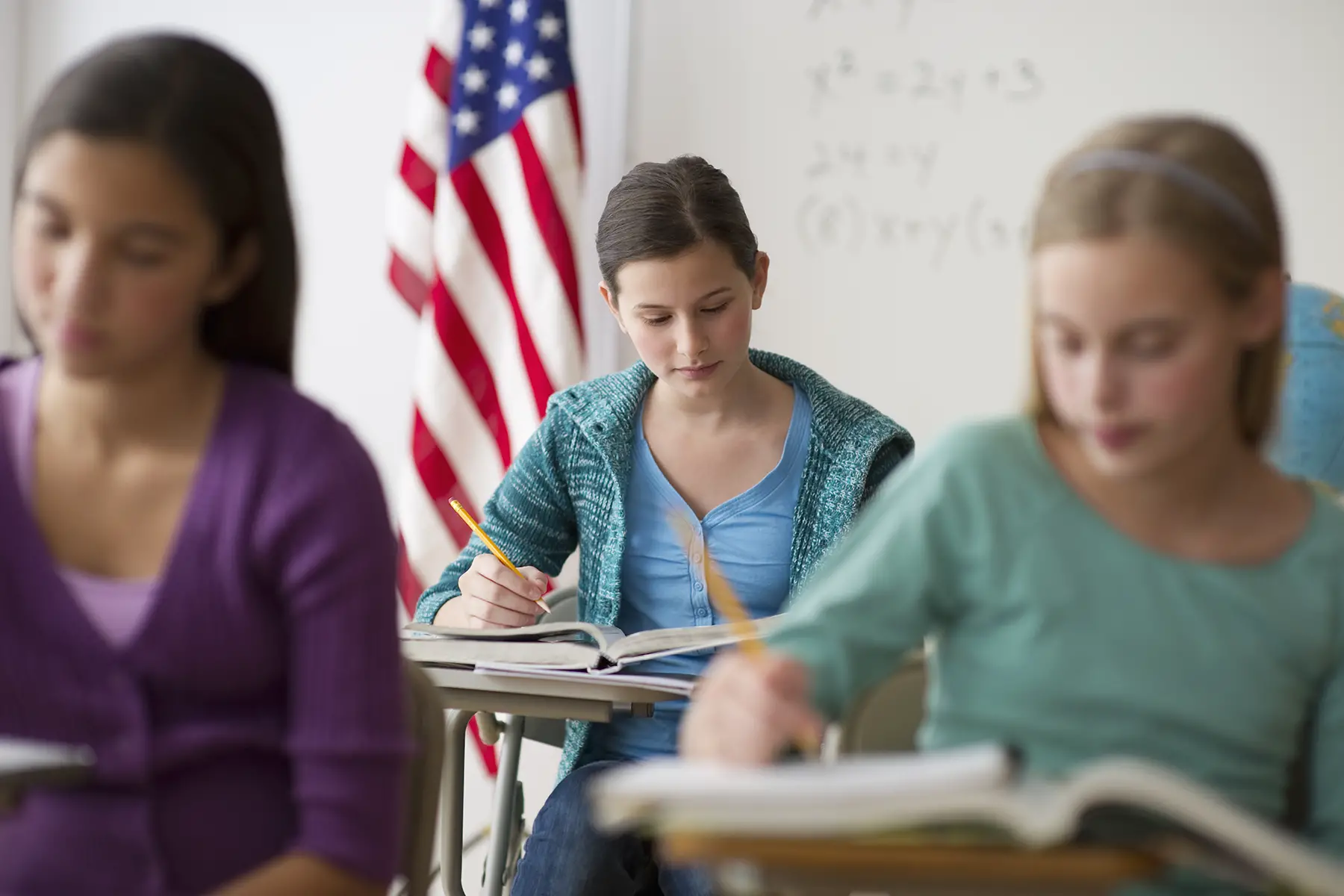
Many parents choose international schools because they offer a similar style of education as their home countries and global qualifications. For example, British schools offer A-Levels, while American schools usually provide Advanced Placement (AP) classes in preparation for university. Your child may acquire the globally recognized International Baccalaureate (IB) Diploma at some schools.
American international schools
A few international schools in the country follow the education system of the United States of America (USA). Classes are usually in English. In their last years, students can take AP classes and sit the SAT exam to prepare for American universities. The American International School of Cape Town (AISCT) and the American International School of Johannesburg (AISJ) are popular choices.
British international schools
International schools using the Cambridge curriculum are popular for students wishing to follow the British education system or attend universities in the United Kingdom (UK). Students take all the expected academic subjects and some electives at these schools. Usually, they will sit the General Certificate of Secondary Education (GCSE) exams at 16 and the A-Levels in their final year (Year 13).
French international schools
These schools follow the French education system, delivered in a bilingual setup that includes French and English. In Seconde — Grade 10 — students study a few subjects like literature or economics before focusing on one specialization in their last two years. They will graduate with a French baccalaureate. The Lycée Jules Verne is a popular French international school in South Africa.
The pros and cons of international schools in South Africa
International schools in South Africa have advantages and disadvantages. The biggest plus, perhaps, is that they offer a significantly higher standard of tuition than state high schools in the country. Students enjoy a well-rounded education, good facilities, activities, and a culturally diverse environment.
Of course, international schools allow learners to transfer easily to curriculums in other countries or back home if they follow a country-specific syllabus.
However, the most significant disadvantage of international schools in South Africa is the high tuition fees. Schools are also located in major cities. So, if you move to a small town, there may be none locally, meaning your child would have a long commute or need boarding options. Finally, students tend to integrate less successfully into the local culture and society.
Graduating in South Africa
To graduate from state secondary education in South Africa and receive the National Senior Certificate (NSC)— or Matric — students must pass the National Senior Certificate Examinations. Those in technical colleges will instead receive the National Certificate: Vocational.
Students are assessed across seven subjects. Four are mandatory, and three are elective. The compulsory subjects include two official national languages, mathematics, and LO.
If learners want to study further at a South African university, the minimum requirement is a Level 4 result (50–59%) in at least four subjects, plus a Matriculation Endorsement or Bachelor’s Pass for their Matric.
Conversely, at many independent schools, students can graduate with an International Examinations Board (IEB) qualification. It claims to be a more rigorous academic program, equivalent to A-Levels, which prepares students better for international life and studies.
Of course, many international schools follow their home country’s curriculum. Therefore, students will graduate with qualifications, such as the British A-Levels, the French baccalaureate, or the American high school diploma. Indeed, a few independent schools also offer the International Baccalaureate (IB) Diploma.
The International Baccalaureate (IB) Diploma in South Africa
Currently, only three IB World Schools offer secondary education in South Africa. So, to take the two-year program and graduate with an International Baccalaureate (IB) Diploma, students would go to the American International School of Johannesburg, Hout Bay International School, or Redhill School. Many universities globally recognize the IB Diploma, making it a popular choice of secondary education qualification for international families.
Trade schools in South Africa
Between the ages of 16 and 18, students can attend one of 50 technical and vocational training institutions (TVET colleges) to finish their technical secondary education in South Africa. These are generally commercial colleges that receive government subsidies, and the standard of education is often better than other state schools. Because the government subsidizes 80% of the fees, costs range from R7,500–30,000 per year, depending on the course.
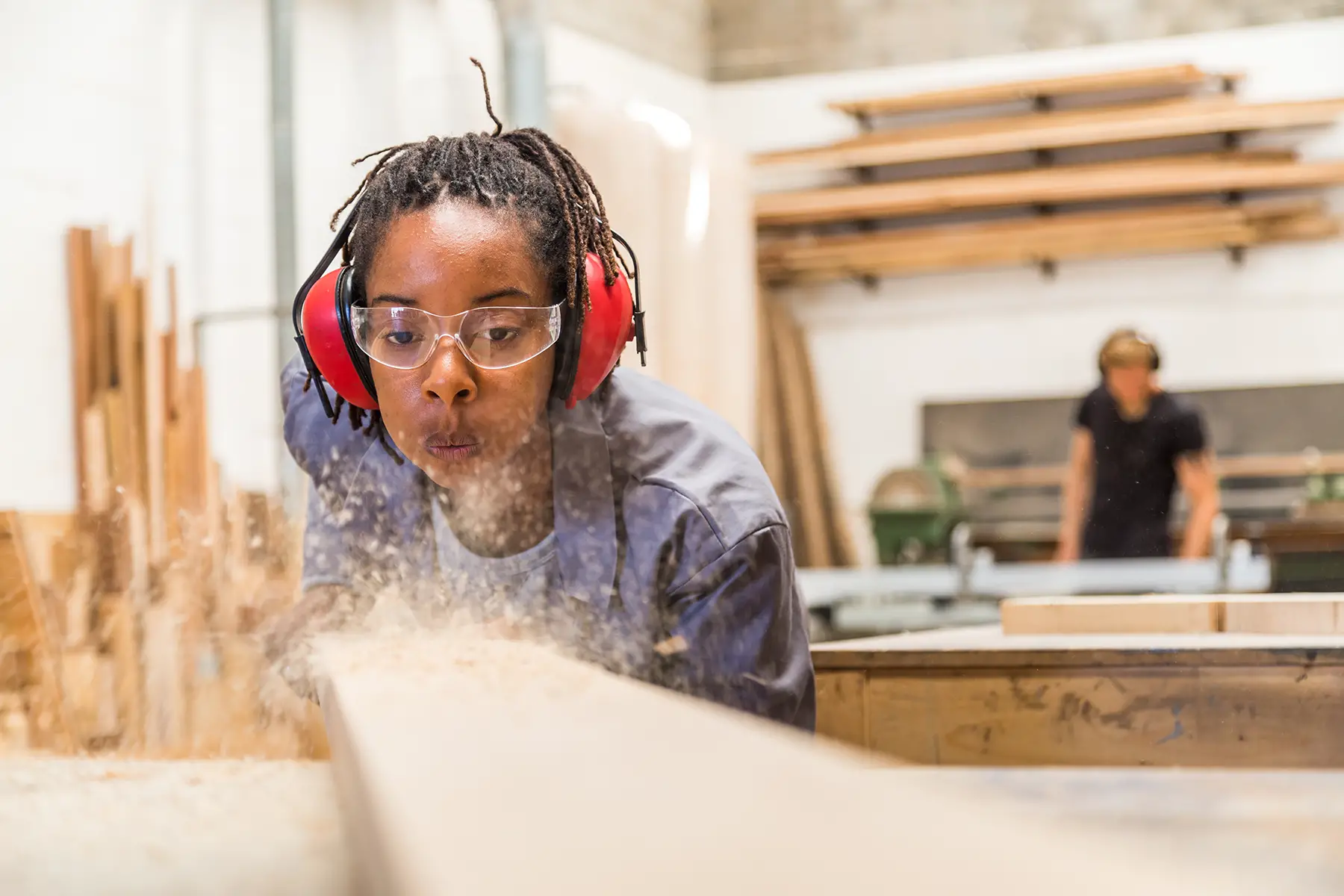
The advantage of TVET colleges is that students can receive practical training in their chosen careers. For example, the College of Cape Town offers specializations and training in hair and beauty care, education, hospitality, electrical engineering, and information technology (IT).
To apply to a TVET college, students must have at least completed their compulsory secondary education (Grade 9). Failing this, or if a student can’t access their academic records, the TVET college will require them to write a skills test. Typically, the application process will start with a pre-screening test, followed by submitting an application form and supporting documents, such as:
- Photo identity document
- Proof of residential address
- Copy of highest qualification achieved



